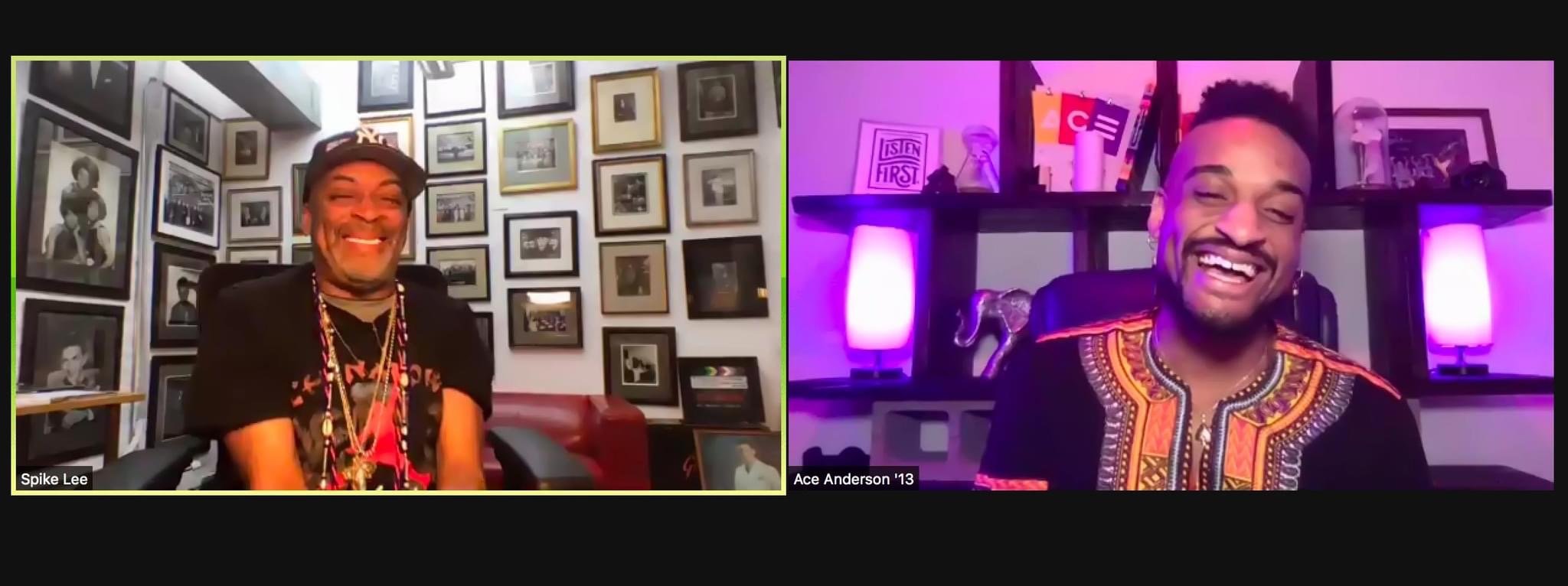A candid conversation with Spike Lee
Spike Lee has redefined how we look at Black culture in America through epic films like Do the Right Thing, Mo’ Better Blues, Malcolm X and, most recently, Da’ Five Bloods. On Tuesday, October 20, during the week of SMU’s 100th Homecoming celebration – he talked with Ace Anderson ’13 about a wide range of subjects, including culture, giving back, empowering the next generation and being a filmmaker. The special virtual event was presented by the Black Alumni of SMU Board in partnership with the Tate Lecture Series and raised nearly $40,000 for the Black Alumni of SMU Scholarship Fund.
Almost every year since 1988, the Oscar- and Emmy-winning filmmaker has released a new movie. Lee comes from a long line of educators has been a professor of film at NYU for more than 20 years.
Lee’s candid conversation with Anderson clocked in around 40 minutes. Here are some of our favorite moments.
Giving credit where credit is due
Regarding being a third-generation legacy at Morehouse (class of 1979) where Martin Luther King III was one of his classmates: “I’ve got to say this because a lot of time I get a lot of flak because I didn’t take my major at Morehouse. I took my major across the street at Clark College, which is now CAU (Clark Atlanta University). I’ve got keep reminding myself that I’ve got to give love to Clark AU too.”
Who gave him the gift of confidence
“Film found me. My freshman, sophomore year, I was just drifting.”
The “tumultuous summer of 1977” was a turning point for . Lee. There were no summer jobs to be had, so when a friend gifted him a Super 8 camera and a box of film, he started filming.
It was the “summer of the black out – so I saw my fellow Puerto Rican and African American brothers and sisters looting, I filmed that. It was the first summer of disco, so every weekend there were block parties and DJs were hooking up their turn tables and speakers to the street lamps… people were doing the hustle – and then there was a psychopath called David Berkowitz – Son of Sam. It was bananas, New York City.”
After returning the fall of his junior year and declaring a major in mass communications, his focus was set and his grades improved drastically. He went from being a C/D student to an A+ student. Lee credits this change to Professor Herbert Eichelberger, the man who encouraged him to turn his footage into a documentary that eventually became Last Hustle of Brooklyn, Lee’s first film.
“I’m not the only one who has had their life changed by a professor, a teacher, a mentor, someone for whatever reason took interest in you and for me it was Dr. Herb Eichelberger.”
“When someone looks at you and says you have a gift, when they tell you, like yo’ my sister/my brother you’ve got something special, they give you the confidence in something that you didn’t know that you had.”
On launching the careers of many now-famous actors and actresses
“I knew from the get go that there’s a ton of talent out there, but if people don’t get a chance to display their talent, how are you going to be seen? So sometimes when I’m writing I know who I want for the role or what I’m looking for, but other times, which gives me great pleasure, is when someone comes in and my casting director says, you should look at this person, somebody I don’t even know who they are – never met them, never heard of them – and they just kill the audition. I mean that’s a great, great, great feeling when I get surprised like that.”
Advice for the generation that stands before him now on handling the stories that will emerge from our current social justice movement
“It is my belief that in this crazy world that we live in of the two pandemics, I think artists will lead the way. I think great art, whatever the art form be, it is going to be told.”
“In no way shape or form am I negating historians. … We need historians – to tell the truth, but I think that artists will lead the way. I think there are going to be great movies, plays, novels, poetry, music sculpture photography, I could go on and on – that will be the definitive word on what we were going through now, which has never happened before ever.”
“Artists will lead the way. I will put money down on that.”
In response to the question: “As a white artist, how can I be most effective as an ally to help the Black community without misappropriating Black culture?”
“I think if you have truth in your heart, you won’t step into that fuzzy world of appropriation of culture. If you understand it, you know what appropriation is then you won’t do it. And white artists can be involved with the experience. But the tricky thing is that you have to humble yourself and put yourself in the mindset – I’m saying this, but I just can’t come in here Bogarting and telling everybody this is the way that it is. You have to have some humility”

